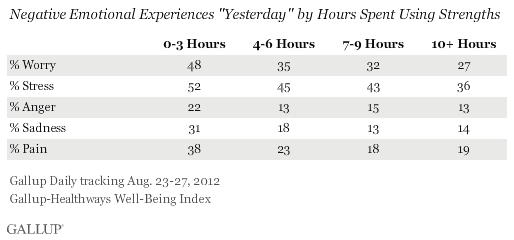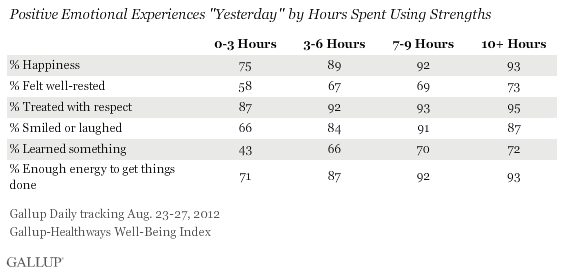Everyone always says you should play to your strengths. After all, when you’re doing something you’re good at, you’ll naturally do better and see good results. However, there’s also an underlying psychological reason to do work that you’re naturally good at that will improve your mindset.
Let’s take a look at why doing a job you’re good at will boost your mood.
How Your Passions Boost Your Mood
You may already expect that doing a job you’re good at makes you happier. After all, doing something you love is a pleasure, while doing a job you’re bad at is stressful. However, there is scientific research that points toward how much it does help.
A study in 2012 recorded how much doing a job you’re good at enhances your mental health. 5,049 American adults were tasked to perform jobs that they’re good at over different periods of time. Some worked for under three hours while others worked over 10.
The next day they were asked: “About how many hours out of the day yesterday were you able to use your strengths to do what you do best?” They would then score their emotions depending on how they felt during the previous day.
Negative Emotions Felt During Favorable Work
Surprisingly, when you look at the table on the 0-3 hours bracket, people feel quite a lot of negative emotion. Almost 50 percent of participants said they felt worry and stress while doing their job in this bracket.

However, as time goes on, these percentages begin to decrease By 4-6 hours, the feelings of anger, sadness, and pain drop quite a bit; by 10+ hours, worry and stress is much less than before.
Positive Emotions Felt During Favorable Work
As you may expect, positive emotions climb while negative ones fade away. Already at the start, people felt many positive emotions; however, this climbs even higher the longer they work on what they know they’re good at.

What’s interesting here is the percentage of people who felt they learnt something during the day. This starts off at 43 percent, which is the lowest stat in its bracket by a fair amount. By the time 10 hours have passed, the number of people who felt they learnt something nearly doubles.
How Accurate Was the Study and Conclusion?
When covering a topic such as emotions and feelings toward a certain task, things get a little blurry and unreliable. This isn’t due to the study method, however; it’s more to do with how we perceive our own feelings and how they influence us.
If we consider how we felt over a specific event on the same day it happened, our perception may be skewed depending on certain elements. For example, if you did really good work at the very end of the day, you may oversee the struggles you had at the start.
As such, while this study may not seem too reliable, it’s as reliable as our ability to accurately recount our emotions.
What Does this Mean About Playing to Your Strengths?
The obvious conclusion we can take from this data is that doing what you’re good at makes you happy. When you’re skilled at your job, you’re not as stressed; when you have to wing it because you’re unsure of what you’re doing, it creates anxiety.

However, it also shows us that when we work on something we love, the feeling of happiness doesn’t hit the moment we sit down in the chair. We have to break the three-hour mark before the feelings of positivity and usefulness begin to kick in – before then, it’s a bit of a slog.
If you’re doing work you love yet can’t seem to get the motor running in the morning, it’s perfectly normal. Just keep at it and see if your mood increases. If it does around the four-hour mark, great. If not, it may be a sign that something in your work life is a little askew.
When you work, try to get the easiest stuff done in the first three hours of work. This is when you’re still “warming up” to the idea of getting work done. Once you’ve passed the hurdle, you’ll feel more mentally capable of tackling the harder stuff. Starting with the hard stuff early may cause you to stall instead, so be careful how you treat those first three hours.
Work Happier, Work Better
Working on what you love naturally helps you work better – after all, you love it! However, this study shows that your mental health is affected by your work. The more you do, the happier you are, which is why it’s important to do work that you love.
If you need help finding your line of work, check out how to find your niche, and why it’s important.

